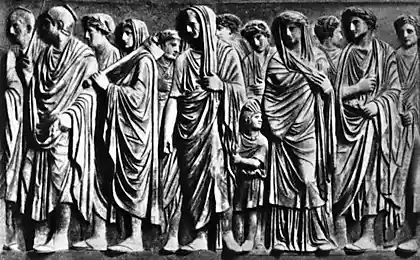887
The most stupid taxes
As you know, during the economic crisis, the first thing the government has resorted to the "help" of the population, increasing or introducing new taxes. This process always takes place, and some of the stupid, absurd and ridiculous taxes, I will describe to you today.
10 facts via mindhobby
Bearded tax
This tax was introduced by Peter the Great in 1689. It was a clear separation of types of beards - merchant, Boyar, peasants and others. The farmer could not wear a beard for free only in his erevne, but at the entrance to the city was paying 1 penny. The bearded man was obliged to go to a special uncomfortable Coat with high collar, and if he showed up in an inappropriate form, it imposed a fine, and for each separate occurrence! Insolvency sent to hard labor work fine. Hard ...

Tax on Drugs
This tax will be the most meaningless. In the US there is an organization called the Internal Revenue Service (like our tax inspectorate), which literally requires that for "... the illegal income derived from the sale of drugs to be included in Form 1040, line 21 ...". I wonder just which of the dealers will be so tormented conscience to voluntarily admit to the crime only to pay all taxes owed to the state?

Tax exemption from slavery
In ancient Rome, there was the so-called tax free (manumission), which was to be paid in the event of the release of the master of his servant. In some cases, the owner himself was paying this tax, since it implies that he is rich enough to let the slave free. In most cases, the tax paid himself free! Imagine - a slave paid a large sum for his release, became a free worker, and it turns out that he has to pay the amount to Rome because he is free. Zhzhest ...

Tax for disagreeing with the King
The dream of modern rulers - to tax dissenters so that they could not breathe and change your mind, or simply died out of hunger. It turns out that there is a precedent in the history of this tax - in 1655, Oliver Cromwell (not a king, but the man, dressed in their time of great power) taxed royalists threatened England. This money Cromwell regulated militia, whose members protected by the state of the hated royalists. At least, if it was clear what is this tax.

Tax on life
This is generally the dream of all the tax authorities - to impose taxes on the entire population, not related to the activity, the profit or the person's age. As planned by the rulers of England, people had to pay a tax simply because they are alive, that is, it was in fact a tax on life! Such happiness for residents of England halts in the 14th century and ended with a grand rebellion, which in English history known as the Peasants' Revolt.

Nobel tax
Do you think scientists received the Nobel Prize for excellence, do not pay with her taxes? Certainly not - pay as pretty! Since 1986, this prize falls within the category of cash gifts and subject to applicable taxes. What percentage is paid to the state, I have not found - Online irs.gov can break the head, but the fact is telling. The only exception is if the laureate donates it to charity (which is understandable, because he had no money left), or support of any school or college, which he points out the state.

Tax on foreign
This tax is in our time, even seems to be something normal - once you come to another country, whether it is good to pay taxes. Such taxes in different states were until the 20th century. For example, in Canada until 1923 he operated a tax on Chinese. Chinese arrived in Canada a lot of money from the tax received too much. In 1923, this tax was canceled. You think they cared about the Chinese? It would not be so easy instead passed a law prohibiting Chinese from entering the territory of Canada did not.

Tax pipe
When the governor of the state has taxed everything that moves and breathes, it is necessary to invent new taxes to replenish the treasury. The population also does not sleep, hiding objects of taxes under the floor, digging in the ground or tucking into the chimney. To stop this disgrace in 1660 in England was passed svetlogolovoy tax hearth. Now, what to hide or not hide - is obliged to pay tax! More specifically, the tax obkladyvayut chimney. The population then began to cheat, examining their chimneys and secretly using neighbors', or sharing one pipe into multiple rooms. After 1684 there was a major fire that destroyed 20 houses, the tax was abolished.

Danish money
The 991 was introduced in England, the land tax for the payment of ransom by the Danish Vikings for the opportunity to a quiet life. So, Denmark to tax residents of another country - is very inventive. This tax lasted until 1194, that is almost 200 years old. To tell the truth, then the money will not go to Denmark, and remained in England for the purchase of weapons and to strengthen the country's defense, as it is now said.

The tax on salt
At first glance, nothing special tax is not - well, the salt tax, just something ... But it turns out, because of the tax occurred in the history of such large-scale events that are simply amazing! Because of this tax result declined Chinese empire, a tax on salt in France (the gabelle) accelerated the development of the French Revolution. Even Mahatma Gandhi participated in the demonstrations against the introduction of the salt tax in India. By the way, the amount of tax on salt in India, established by England, was ... 4000 percent, so it is no wonder that this has resulted in large-scale protests. England once burned is not a child, and I want to say, "Enlightened Europe" So if you want a revolution took place in the state, it is sufficient to introduce a tax on salt and wait a bit.
It's only a dozen of the most absurd taxes, and in general in the history of their hundreds.

Source:
10 facts via mindhobby
Bearded tax
This tax was introduced by Peter the Great in 1689. It was a clear separation of types of beards - merchant, Boyar, peasants and others. The farmer could not wear a beard for free only in his erevne, but at the entrance to the city was paying 1 penny. The bearded man was obliged to go to a special uncomfortable Coat with high collar, and if he showed up in an inappropriate form, it imposed a fine, and for each separate occurrence! Insolvency sent to hard labor work fine. Hard ...

Tax on Drugs
This tax will be the most meaningless. In the US there is an organization called the Internal Revenue Service (like our tax inspectorate), which literally requires that for "... the illegal income derived from the sale of drugs to be included in Form 1040, line 21 ...". I wonder just which of the dealers will be so tormented conscience to voluntarily admit to the crime only to pay all taxes owed to the state?

Tax exemption from slavery
In ancient Rome, there was the so-called tax free (manumission), which was to be paid in the event of the release of the master of his servant. In some cases, the owner himself was paying this tax, since it implies that he is rich enough to let the slave free. In most cases, the tax paid himself free! Imagine - a slave paid a large sum for his release, became a free worker, and it turns out that he has to pay the amount to Rome because he is free. Zhzhest ...

Tax for disagreeing with the King
The dream of modern rulers - to tax dissenters so that they could not breathe and change your mind, or simply died out of hunger. It turns out that there is a precedent in the history of this tax - in 1655, Oliver Cromwell (not a king, but the man, dressed in their time of great power) taxed royalists threatened England. This money Cromwell regulated militia, whose members protected by the state of the hated royalists. At least, if it was clear what is this tax.

Tax on life
This is generally the dream of all the tax authorities - to impose taxes on the entire population, not related to the activity, the profit or the person's age. As planned by the rulers of England, people had to pay a tax simply because they are alive, that is, it was in fact a tax on life! Such happiness for residents of England halts in the 14th century and ended with a grand rebellion, which in English history known as the Peasants' Revolt.

Nobel tax
Do you think scientists received the Nobel Prize for excellence, do not pay with her taxes? Certainly not - pay as pretty! Since 1986, this prize falls within the category of cash gifts and subject to applicable taxes. What percentage is paid to the state, I have not found - Online irs.gov can break the head, but the fact is telling. The only exception is if the laureate donates it to charity (which is understandable, because he had no money left), or support of any school or college, which he points out the state.

Tax on foreign
This tax is in our time, even seems to be something normal - once you come to another country, whether it is good to pay taxes. Such taxes in different states were until the 20th century. For example, in Canada until 1923 he operated a tax on Chinese. Chinese arrived in Canada a lot of money from the tax received too much. In 1923, this tax was canceled. You think they cared about the Chinese? It would not be so easy instead passed a law prohibiting Chinese from entering the territory of Canada did not.

Tax pipe
When the governor of the state has taxed everything that moves and breathes, it is necessary to invent new taxes to replenish the treasury. The population also does not sleep, hiding objects of taxes under the floor, digging in the ground or tucking into the chimney. To stop this disgrace in 1660 in England was passed svetlogolovoy tax hearth. Now, what to hide or not hide - is obliged to pay tax! More specifically, the tax obkladyvayut chimney. The population then began to cheat, examining their chimneys and secretly using neighbors', or sharing one pipe into multiple rooms. After 1684 there was a major fire that destroyed 20 houses, the tax was abolished.

Danish money
The 991 was introduced in England, the land tax for the payment of ransom by the Danish Vikings for the opportunity to a quiet life. So, Denmark to tax residents of another country - is very inventive. This tax lasted until 1194, that is almost 200 years old. To tell the truth, then the money will not go to Denmark, and remained in England for the purchase of weapons and to strengthen the country's defense, as it is now said.

The tax on salt
At first glance, nothing special tax is not - well, the salt tax, just something ... But it turns out, because of the tax occurred in the history of such large-scale events that are simply amazing! Because of this tax result declined Chinese empire, a tax on salt in France (the gabelle) accelerated the development of the French Revolution. Even Mahatma Gandhi participated in the demonstrations against the introduction of the salt tax in India. By the way, the amount of tax on salt in India, established by England, was ... 4000 percent, so it is no wonder that this has resulted in large-scale protests. England once burned is not a child, and I want to say, "Enlightened Europe" So if you want a revolution took place in the state, it is sufficient to introduce a tax on salt and wait a bit.
It's only a dozen of the most absurd taxes, and in general in the history of their hundreds.

Source:























